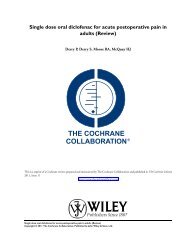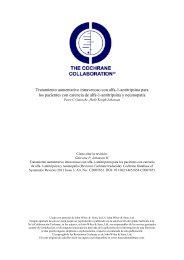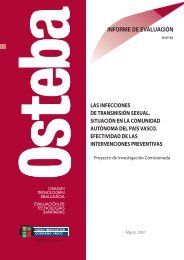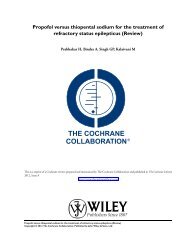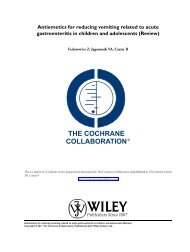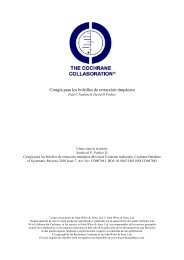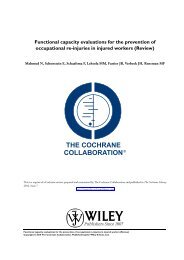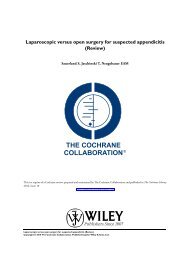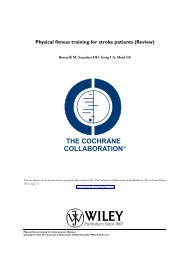Non-pharmacological interventions for caregivers ... - Update Software
Non-pharmacological interventions for caregivers ... - Update Software
Non-pharmacological interventions for caregivers ... - Update Software
You also want an ePaper? Increase the reach of your titles
YUMPU automatically turns print PDFs into web optimized ePapers that Google loves.
Ostwald 2007<br />
Methods RCT<br />
Participants Inclusion criteria: patient experienced a stroke within the last year, age 50 or older, going home with a spouse or<br />
committed partner, needs daily assistance, live within 50 miles of the Texas Medical Centre, can be reached by<br />
telephone, able to understand English<br />
Exclusion criteria: admitted from or being discharged to a nursing home, disability requiring total assistance, lethargic,<br />
obtunded or comatose, other significant CNS disease (i.e. severe Parkinson’s disease), severe psychopathology, globally<br />
aphasic, other major illness that would interfere with rehabilitation (i.e. advanced cancer)<br />
Interventions This 5-year randomised intervention study uses an advanced practice nurse, with the assistance of an interdisciplinary<br />
rehabilitation team, to provide education, support, skill training, counselling, and social and community linkages<br />
to stroke survivors and their spouses <strong>for</strong> 6 months post-hospital discharge. The intervention will be delivered using<br />
previously tested protocol guidelines. No in<strong>for</strong>mation available on comparator<br />
Outcomes Primary outcome measures: stroke survivor function, stroke survivor and caregiver quality of life, stroke survivor and<br />
caregiver stress, stroke survivor and caregiver depression, service utilisation, cytokine levels of <strong>caregivers</strong><br />
Secondary outcome measures: family coping styles, social support system, caregiver preparation, marital relationship<br />
Notes Contacted principal investigator Sharon K Ostwald <strong>for</strong> further in<strong>for</strong>mation. No response received<br />
CNS: central nervous system<br />
CT: computerised tomography<br />
MRI: magnetic resonance imaging<br />
RCT: randomised controlled trial<br />
SAH: subarachnoid haemorrhage<br />
TIA: transient ischaemic attack<br />
Characteristics of ongoing studies [ordered by study ID]<br />
Bakas 2010<br />
Trial name or title Telephone assessment and skill-building kit <strong>for</strong> stroke <strong>caregivers</strong><br />
Methods RCT<br />
Participants No further in<strong>for</strong>mation available at present<br />
Interventions Telephone assessment and skill-building kit<br />
Outcomes No further in<strong>for</strong>mation available at present<br />
Starting date 2010<br />
Contact in<strong>for</strong>mation Professor Tamilyn Bakas, School of Nursing, Indiana University, USA<br />
Tel: ++1 317 274 4695<br />
Email: tbakas@iupui.edu<br />
<strong>Non</strong>-<strong>pharmacological</strong> <strong>interventions</strong> <strong>for</strong> <strong>caregivers</strong> of stroke survivors (Review)<br />
Copyright © 2011 The Cochrane Collaboration. Published by John Wiley & Sons, Ltd.<br />
37



